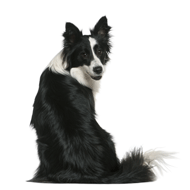New DNA test for glaucoma-causing mutation in border collies

“Our research has found that the mutation is only associated with glaucoma in border collies."
The Animal Health Trust has launched a new DNA test for the genetic mutation that causes glaucoma in border collies.
Scientists from the Roslin Institute originally identified a variant in the gene OLFML3, which is associated with severe goniodysgenesis and glaucoma in this dog breed.
On reading the research, the Animal Health Trust’s genetics team genotyped a large cohort of border collies for the mutation, which allowed the team to obtain an accurate measure of the association between the mutation and goniodysgenesis and glaucoma. All dogs were also given an eye examination and had DNA collected.
The new test was developed and launched following this validation process, which replicated the findings from the Roslin Institute. Breeders will now be able to use the test to reduce the risk of producing puppies affected with glaucoma, which affects more than 1,000 dogs across the UK.
Dr Cathryn Mellersh, head of canine genetics at the Animal Health Trust, said: “We’re delighted to offer this test to border collie breeders and hope in time, through its use, we can lessen the prevalence of this disease in this lovely breed.
“Our research has found that the mutation is only associated with glaucoma in border collies, so we will publish our data at the earliest opportunity, in the hope that other commercial DNA testing providers will not be tempted to make the DNA test available to breeds other than the border collie.”



 The latest
The latest